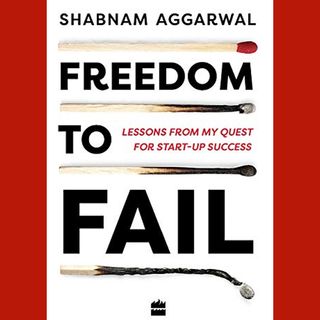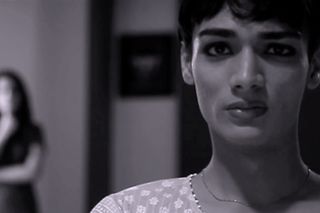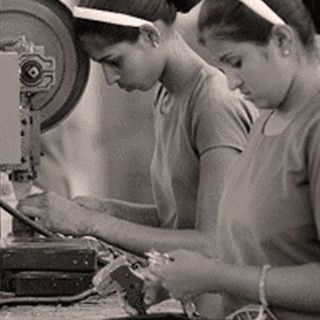
Farhan Akhtar’s 3‑Minute Film on Sexual Harassment Asks Men to Imagine Being a Woman
But leaning on empathy to inspire change generally backfires.

Last Sunday, actor Farhan Akhtar released a short film called She, through his social change campaign, MARD (Men Against Rape and Discrimination). The three-minute short, released in honor of the International Day for the Elimination of Violence Against Women, was made in collaboration with filmmaker Feroz Abbas Khan and PFI (Population Foundation of India). It explores the different kinds of sexual harassment women face on the streets every day, from the casual groping and catcalling, to outright assault.
The camera follows a woman’s silhouette, framing her waist or shoulders, as the viewer’s gaze is directed toward the street and the reactions of men who watch the woman walk. It’s only at the end of the film that we get to see her face, when she runs back home after being hassled and chased by a man. As she sits down, visibly upset, she takes a wig off and says in a much lower octave than expected, “How do you girls deal with this? This disgusting behavior … every day, all the time, everywhere. I couldn’t bear it even for an hour.” The hashtag ‘SehKeDekho’ flashes across the screen, in case viewers didn’t get the twist — it was a man who the camera was following, and he had to experience harassment dressed as a woman to truly understand what it’s like.
Article continues below
When the three minutes are up, though, I’m left feeling weird about this whole project. I’m not sure what the argument is here — that men should bear what it’s like to be a woman on the streets? That experiencing life as a woman is the solution to violence against women? Or the assumption that it’s so unimaginable for men to see women as human beings worthy of respect, that they must put themselves, literally, in women’s shoes in order to accept their humanity? Bring on the fake lashes, because this is going to be a long, weird campaign.
I respect Akhtar and MARD’s intentions, and yes — sometimes a very obvious representation of some of the ways women face harassment and violence is welcome, especially if men are more likely to listen with a big Bollywood name behind it. But I also wonder if there’s something inherently wrong with the way we’re approaching this issue.
“Empathy sustains the very difference that it may seek to overcome.”
In a statement about the campaign, Akhtar said, “For women to feel safe in our society, it is important that men change their mentality and behavior. This short film She gives the other perspective — of how ignorant men are about this violence. It is imperative that men understand the humiliation that women go through. Only then will they truly make an effort to change.”
Is that really true? That only when men embody and understand the ‘humiliation’ of women will change occur? It’s funny, we don’t ever see women being called upon to do something like this — somehow they don’t need a reminder or visual stimulus to empathize with someone. While many studies find that women are more empathetic than men, they also show that this difference is not innate, but a consequence of societal expectation: Women know they must be more empathetic and therefore are. Instead of banking on men to have empathy, to believe in the humanity of women, the premise of the film feels like the ‘imagine if this was your wife/mother/sister/daughter’ argument, gone rogue. Imagine if this was you.
Social movements based on empathy, on expecting people to understand and share the feelings of a group of people who are different than them, seem tempting — but ultimately will fail. Researcher and professor, Megan Boler, outlines the danger of ‘passive empathy,’ where feelings of empathy depend on a difference that can never be overcome. A cis man will never actually have to live life as a woman, so imagining himself in her shoes is an exercise with no risks for him. Instead of genuinely engaging with the concerns of women, this kind of detached understanding of what women experience might allow men to sympathize but won’t necessarily inspire change. As theorist Sara Ahmed argues, “Empathy sustains the very difference that it may seek to overcome.”
Rather than imagine what it’s like to be a woman, and marvel at how they can bear it everyday, we need to call on men to imagine what it’s like to be a man who respects women, who affords them humanity, who calls out harassment and violence when he sees it, and who listens and makes the space for women’s voices and experiences to be heard. Do the work. Be self-reflexive. That is what’s going to affect real change. Not walking down the street in a wig.
Nadia Nooreyezdan is The Swaddle's culture editor. Since graduating from Columbia Journalism School, she spends her time thinking about aliens, cyborgs, and social justice sci-fi. She's also working on a memoir about her family's journey from Iran to India.
Related


India Has the Fastest Wage Growth, But Highest Gender Wage Gap
